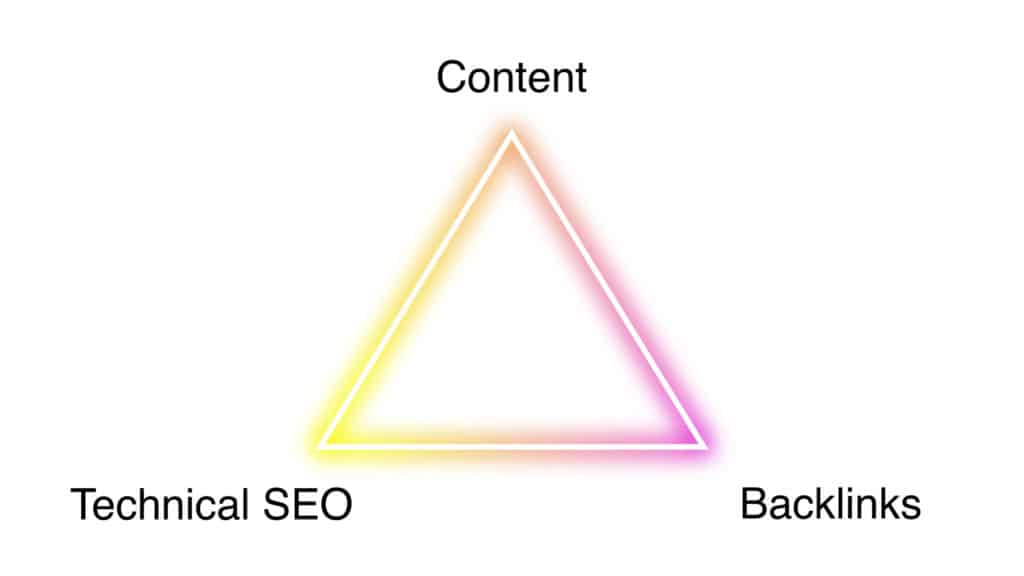An astonishing 252,000 websites are being created daily worldwide, amounting to a massive 30 billion pages circulating the internet. Yet, according to a recent study, over 96% of these pages fail miserably in getting organic traffic from Google.

One familiar reason behind these huge cases of underperforming businesses is missing the mark on their search engine optimization. Either they’re wading into obscure niches, neglecting link-building, or falling flat in their technical SEO strategy—the golden SEO triangle.
Keep reading to learn more about these three most important aspects of search engine optimization.
Table of Contents
What Is the SEO Triangle?
There are loads of important factors that can affect your business’s SEO success. However, when it comes to search engine rankings, digital marketing experts typically look at the SEO triangle: content, backlinks, and technical SEO.
Content in SEO
Content SEO, also called on-page SEO, is the backbone of every successful website. Without it, you’re practically invisible to search engines and your target audience. It’s like selling a product in a shop no one knows where—or even knows exists!
Businesses use high-quality content to let search engines know they exist and are worth recommending to potential customers. It brings you to the forefront and closer to your audience, providing plenty of opportunities to grow your business.
There are several forms of content you can produce for SEO purposes. Articles, blogs, infographics, social media posts, and emails belong to this category. Marketing teams often use multiple types of content across different platforms as part of their digital marketing strategy.
Link-Building in SEO
Link-building is an SEO strategy that involves acquiring links pointing to your web pages, called backlinks. Getting these backlinks is important because they tell Google that your website is credible and authoritative.
Search engines treat backlinks as votes of confidence from other sites. But it doesn’t treat every referral equally. Some backlinks, such as those that come from reputable domains, are given more importance than those coming in from minor websites.
Some examples of reputable domains include registered organizations (.org), educational institutions (.edu), and government agencies (.gov).
Google’s search engine algorithms take your website’s backlink profile to determine its place in the SERPs. The more high-quality backlinks you get, the higher your pages rank in unpaid search engine results.
Technical Aspects in SEO
Technical SEO deals with the behind-the-scenes aspects of your website, ensuring it meets current search engine requirements. Meeting these metrics makes it easier for Google to locate, understand, and store your site’s content.
Search engines primarily look at aspects like user experience and functionality. Think of your site’s load speed, how friendly your pages are to mobile devices, or how you organize and layout your content.
Like good content and backlinks, technical SEO is a crucial ranking factor. Do it right and in tandem with your on-page and off-page SEO efforts, and you can watch your visibility in search results soar.

How to Improve Your Content For SEO
There’s no substitute for great content. If you want to succeed online, you must make your audience and search engines love what you offer.
Here are some of the most effective ways to do that:
Publish Relevant and Credible Content
First off, you want to publish content relevant to your business. Quality articles and blogs written specifically for your intended audience’s search intent are a great way to bolster your site’s relevance and authority in your industry.
When writing, lend your expertise and experiences to provide valuable takeaways to your readers. Offering helpful industry insights sets your brand apart from everyone else’s and aligns with Google’s goal of delivering high-quality and relevant information.
Research Keywords and Use Them Strategically
Apart from relevance, you want to identify and use keywords strategically in your content creation. This is called keyword research, and it’s massively important in SEO, whether you’re running a mainstream or niche website.
Place primary and related keyword phrases naturally in the page titles, URLs, headings, and content bodies. This fantastic content strategy helps Google associate your website with the right search intent and queries.
That said, avoid over-saturating your articles or blogs with keywords at the expense of readability. This is a common SEO mistake called keyword stuffing, and search engines typically frown upon this spammy practice.
Update Your Content Frequently
Just because your topics are relevant now doesn’t mean they will be forever. That’s why most search engines consider regular updates a good indicator of website relevancy.
Audit your pages frequently—making updates and edits where needed. Add new and helpful information, rewrite inaccurate claims, introduce new sources, and keep the entire thing fresh for your target audience.

Best Backlink Building Methods For Your SEO
While search engine algorithms continue to evolve, link-building remains a hugely influential ranking factor in SERPs.
Here are a few ways you can earn high-quality backlinks and boost your link profile:
Earn Your Backlinks
Backlinks are votes of confidence from others that your webpage is trustworthy. And is there a better way to earn your audience’s trust than earning it with useful content? When people love what you offer, they share it with others willingly.
Creating compelling and unique content can be an extremely cost-effective way to increase backlinks and domain authority. It saves you from worrying about Google’s spamming policies, as you aren’t the one placing them.
Be Proactive With Your Link-Building
Of course, earning referrals isn’t as easy as it seems. That’s why in most cases, you must be proactive in your link-building efforts. You can conduct email outreach, cooperate with influencers, or start a digital PR.
Communicate with other webmasters and teams and convince them to link to your pages. If you have family and friends working in the same niche or industry, ask them to refer to your website in their social media posts.
Create linkable assets like infographics, charts, original research, tutorials, online tools, and in-depth guides. These types of content tend to get backlinks naturally.

Expert Tips to Enhance Your Technical SEO
Technical SEO boils down to two things: crawlability and indexability. These two are your website’s bread and butter, and how search engines locate, contextualize, and remember your content for ranking.
Below are some expert tips to make crawling and indexing your site easier:
Organize Site Architecture
Your website contains several web pages. Those pages must be organized logically so that it’s easy for search engines to navigate and crawl your content. That’s what we refer to as your site architecture.
One way to do this is to adopt a pyramid content structure. This is where you start from your homepage with the category pages under it and then the individual article or product posts. Your most important pages should always be the closest to your homepage.
Remember, a clear and simple structure is key here. For instance, you want to group related pages together so it doesn’t take more than four clicks to reach a particular page. Internal linking is crucial here, as it acts as a roadmap for search engine crawlers.
Consider Optimizing Your Metadata
Metadata and meta tags are elements in your website contextualizing your content. They help Google bots understand what you’re all about, allowing the search engine to show your pages to the right search results.
Your page titles, meta descriptions, header tags, and image alt texts are all part of your site’s metadata. Optimizing these elements makes your pages more attractive to both your audience and search engines.
Eliminate Technical Problems
Technical issues, such as duplicate content, broken links, improper use of canonical tags, and redirect loops make it tougher for Google to crawl and index a website.
Like a disorganized site architecture, these hiccups hinder crawl bots from navigating your pages effectively.
Implement regular SEO audits to eliminate these technical issues. SEO tools like Semrush, Ahrefs, and Clearscope offer resources to find and remove technical problems that may hinder Google’s crawl bots from doing their jobs.
Optimize Page Speed
Most visitors wait several seconds for a web page to load. The longer they wait, the more likely they are to leave your site. That’s why page speed optimization should be a priority in your technical SEO efforts.
There are several ways to help reduce load time. Compressing all your images, minifying your code, using a content distribution network (CDN), and turning on browser caching can significantly improve site speed.
Moreover, it’s worth noting that, according to Statista, nearly 60% of web traffic comes from mobile devices. So, making your web pages as mobile-friendly as possible has also now become a vital requirement for online success.
Final Thoughts
Learning SEO from scratch can be overwhelming, especially if you’re just getting your feet wet in the digital marketing industry. Still, if you want to dominate a particular niche in page rankings, there’s really no getting around it.
The SEO triangle is a great place to start. Craft your high-quality content firstly for your audience, and secondly for search engines. Double your link-building efforts and polish the technical parts of your SEO.
Used effectively together, the golden trio of SEO makes a strong strategy for improving your site’s visibility, organic traffic, and Google ranking.
Published on: 2024-11-06
Updated on: 2024-11-08